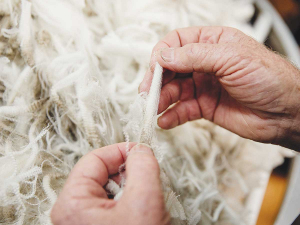Top wool advocate bales out
The conversion of productive farmland into trees has pretty much annihilated the wool industry.
 A new tech start up and social enterprise is set to provide a boost to New Zealand's sustainably sourced wool sales.
A new tech start up and social enterprise is set to provide a boost to New Zealand's sustainably sourced wool sales.
The launch of a new tech start-up and social enterprise is set to provide a significant boost for New Zealand's sustainably sourced wool sales.
Comfi provides a sleep solution for a child in need, including a single bed and base, and a pillow for every five beds sold.
The company is the brainchild of Vicki Eriksen and Susie Harris who developed the concept after struggling to find suitable beds online during the first Covid lockdown.
Other shareholders in the start-up include Neat Meat chief executive Simon Eriksen, Jucy co-founder Tim Alpe, and director/investor Andrew Harris.
A pre-existing relationship between Neat Meat and sheep farmers in Taupo will see the supply of the environmentally friendly wool for use in the manufacture of mattresses.
A collective of sustainable farmers in the Taupo region have committed to maintaining a low intensity stock model, helping to reduce nitrogen levels in Lake Taupo – a nitrogen-sensitive water body.
The per hectare cap on the number of livestock increases farming costs by almost 50% however Comfi has opted to pay a premium for the wool – helping to support the ongoing viability of the farmers. The source of each bale can be traced from paddock through to final product.
The company’s pocket spring mattresses are locally made with the sustainably sourced New Zealand wool and retail at around half the price of equivalent products in brick-and-mortar stores.
A recent mattress production trial showed the wool performed well and could see tonnes of wool utilised by their local contract manufacturers annually.
Vicki Eriksen, Comfi co-founder, says while there has been a rapid rise in online retailers selling imported boxed foam mattresses, these are not suitable for all market segments and the majority of Kiwi bedrooms have inner spring mattresses.
She says the average person spends around 26 years sleeping and purchasing a bed can be a confusing and logistically challenging experience for many.
“Our research shows that Kiwis are traditionally risk averse when buying high ticket items online – particularly beds, and yet the actual trial time in store is generally only a few minutes of lying on the mattress.
“Our model is designed to mitigate the pain points of buying a bed online – we offer a 100-night ‘rest easy’ trial, contactless free delivery, a ten-year warranty and a price point that provides a strong incentive to consider this purchase,” she says.
Eriksen says they pay over twice the market rate for the single sourced wool to help support local farmers and aim to reach a point where they can donate a child’s pocket spring mattress and bed for every one that is purchased.
She says New Zealand has one of the highest rates of asthma in the developed world and University of Auckland research suggests children who sleep on old mattresses have a greater risk of developing respiratory diseases such as asthma.
Mating wrapped up last month at the across-breed Beef Progeny Test on Pāmu’s Kepler Farm in Manapouri.
Libby Judson is a keeper of memories from an age gone by. Tim Fulton tells her story.
A New Zealand-first native tree study has highlighted the Bioeconomy Science Institute's position as a forestry research leader.
Hemp fibre processor Rubisco is relocating its core processing facility to Ashburton as part of a $20-$30 million expansion to leverage what it says is an accelerating global demand for sustainable and renewable fibres.
Tradition meets some of the latest in technology at the 2026 East Coast Farming Expo.
OPINION: Trade Minister Todd McClay and the trade negotiator in government have presented Kiwis with an amazing gift for 2026 - a long awaited and critical free trade deal with India.